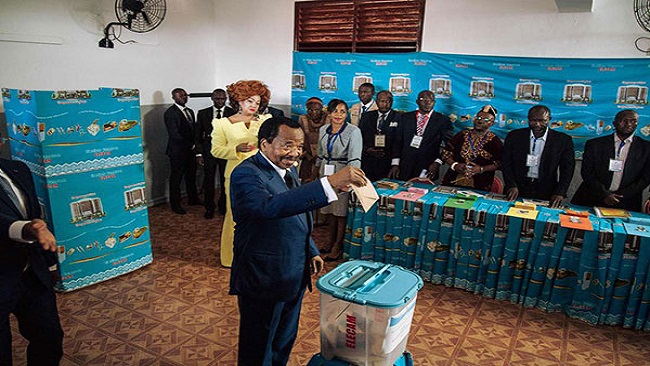Cameroon and Gabon polls were to prolong unpopular regimes of Biya and Ali Bongo
Following elections in Gabon and Cameroon last weekend, it has become clear that the two countries have several things in common.
The polls were expected to prolong unpopular and unstable regimes of Ali Bongo and Paul Biya respectively.
Whereas the oil-rich Gabon held long-delayed legislative and municipal elections on October 6, Cameroonians cast their presidential election ballots the following day.
The two nations are run by regimes that are well past their sell-by dates.
Pointedly, calls for the observance of constitutional term limits have been ignored in Gabon and Cameroon, with incumbents using all kind of tricks to remain in power.
Ali Bongo is the scion of Omar Bongo, who held sway in the country for decades, going down in history as one of Africa’s longest-serving leaders.
VICTORY
Indeed, the older Bongo is remembered for establishing a decades-old dynasty by dint of resisting democratic changes.
While Gabon has been ruled by the same political dynasty for almost half a century, Cameroon’s 85-year-old Biya has been in power since 1982!
But whereas he might have been sitting pretty in the past, political dynamics in Cameroon are rapidly changing. Biya is beginning to find it difficult to keep the volatile country on an even keel.
The situation is slightly different for Ali Bongo, whose ruling Gabonese Democratic Party claimed victory in the legislative poll “by a landslide”.
Even before the announcement of the final results, presidential spokesman Ike Ngouoni said Bongo’s party won 80 of the 143 parliamentary seats in the first round.
That claim should have been taken with a pinch of salt, given that some opposition candidates and witnesses said irregularities marred the poll.
RESULTS
The elections, incidentally boycotted by Bongo’s key rival Jean Ping, were the first ones since a presidential election marred by fraud claims and deadly violence two years ago.
Cameroon faces a long wait for the results, despite victory claims by opposition contender Maurice Kamto.
Kamto, who the is leader of the Movement for the Rebirth of Cameroon, said on Monday that he won the vote, triggering street celebrations.
The ruling Cameroon People’s Democratic Movement accused Kamto of compromising peace.
Pointedly, the poll followed a last-minute attempt by a weak opposition to unite in a desperate bid to dislodge Biya.
Amid the drama, all indications are that Cameroon is headed for a long election dispute.
APATHY
That aside, there was an alarmingly low turnout in the conflict-torn anglophone regions, amid media reports that violence has been spiralling out of control.
“Turnout in the English-speaking regions has been low. Almost all the returns we have seen show a less than five per cent turnout,” International Crisis Group analyst Hans de Marie Heungoup said earlier in the week.
According to media reports, deaths and detentions have been the order of the day in the troubled areas, where the authorities have been cracking down on activists.
The army has been accused of shooting independence activists dead, burning unarmed civilians alive and other abuses.
Unfortunately, the country’s polling process is convoluted, with the final, official tally of the votes expected within 15 days from the date of the election.
Given that scenario, the country is likely to remain in the grip of tension for the coming week, with nobody able to foretell what will happen if Biya wins a seventh term.
Culled from Daily Nation





